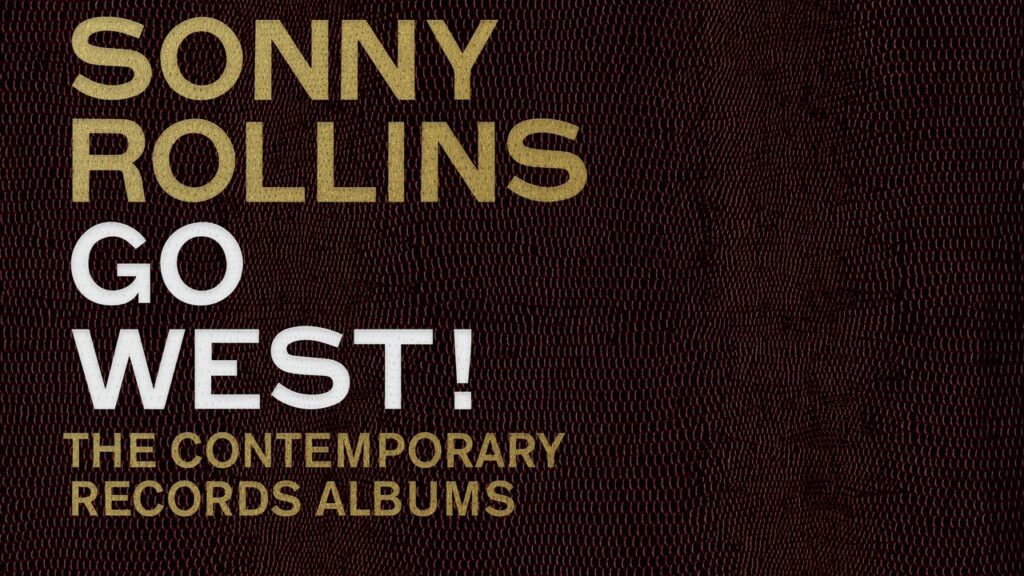
While touring America as part of Max Roach’s group in early 1957, New York saxophonist Sonny Rollins found himself in California, where he settled into a three-week stint at Los Angeles’ Central Avenue club Jazz City. A week into the run, Lester Koenig—a blacklisted screenwriter turned record producer—approached him with an offer to cut a record for his Contemporary Records. Studio time was swiftly booked with two of the top players of the time, drummer Shelly Manne and bassist Ray Brown, and the three musicians knocked out Way Out West in a marathon session starting at 3 in the morning.
Way Out West provides the anchor in Go West: The Contemporary Records Albums, a triple-disc box—available either as a handsome vinyl set or on CD—whose name suggests that Rollins spent a considerable amount of time at Koenig’s label. That’s not the case. The saxophonist cut just one other record for the imprint, Sonny Rollins and the Contemporary Leaders, a 1958 LP where he was paired with a combination of six different musicians who had previously led records at the label. In this set, the two records are supplemented by a disc of alternate takes from both sessions, all but two of which appeared on previous reissues, including an expanded version of Way Out West released in 2018.
Sonny Rollins recorded Way Out West as a trio, introducing a format that has become so commonplace it can be hard to hear how revolutionary it was in the 1950s. Rollins’ combo with no piano or trumpet possibly has its roots in the loss of pianist Richie Powell and trumpeter Clifford Brown, members of the Max Roach Quintet who died in a car accident in June 1956.The tragedy affected Rollins deeply. By the time he cut Way Out West, he tested out the trio format with Roach—the group was obligated to meet the concert dates on their calendar—and Rollins biographer Aidan Levy suggests that “the pianoless trio carries the ache of a phantom limb” on the album. That’s true to an extent. It’s possible to hear where the music could have been filled out with the addition of a piano or trumpet, yet the passage of time has dispersed any ghosts lingering over the session. Rollins seems alive to the possibilities of this freeing format. He later explained that without a pianist dictating chords, he could go anywhere: “A pianist by definition leads the horn players, because of the chords and the volume and everything… I always loved the idea that if I could get a rhythm section—a drummer for the rhythm and the bass player for the basic harmony—then I had the freedom to do what I wanted to do. Which was perfect for me.”
That freedom manifests on Way Out West in fascinating ways. Rollins isn’t above indulging in a little cinematic flair, such as when drummer Shelly Manne mimics the sound of horse hoofs on the opening “I’m an Old Cowhand.” There are nods to Hollywood Westerns throughout, such as a cover of the old 1930s screen hit “Wagon Wheels,” and Rollins’ extended improvisations gesture toward wide vistas. Using the rhythm section as rock-solid support, he roams far from suggested chords—a process he dubbed “strolling”—playing solos that are invigorating and adventurous; the sauntering stride of their version of Duke Ellington’s “Solitude” suggests a cowboy roaming the wide open plain. It’s remarkable how picturesque a combo featuring only Rollins, Manne, and bassist Brown can be. In the musicians’ sparing touch and careful interplay—just listen to the ample room they leave for each other in “Solitude”—they positively luxuriate in evocatively wide-open spaces.
Way Out West is such a titanic effort that it overshadows its companion Contemporary album. Jazz Review critic Amiri Baraka, in fact, called Sonny Rollins and the Contemporary Leaders “shallow and superfluous” upon its release in 1959. Ever since, the record has been treated like a footnote, yet the subdued quality of Contemporary Leaders seems intentional. Hunkering down for three days of recording on Melrose Avenue, Rollins was paired with a set of musicians who all had led sessions for Contemporary, including Manne, guitarist Barney Kessell, pianist Hampton Hawes, and bassist Leroy Vinnegar. He brought them a selection of standards, pairing songs like “The Song Is You,” from the Frank Sinatra songbook, with “Rock a Bye Your Baby with a Dixie Melody,” an old minstrel tune sung by Al Jolson.
Where there was a distinct edge to Rollins’ 1956 breakthrough album Saxophone Colossus, the performances on Contemporary Leaders are breezier. Koenig may have claimed that he coined the phrase “West Coast jazz” as a marketing device, but the records on Contemporary did seem to run a few degrees cooler than their East Coast counterparts. They may have shared the same post-bop vernacular, but they operated with a smooth reserve. Barney Kessel’s elegant, swinging guitar on Contemporary Leaders steers the record toward familiar West Coast territory, a place that Rollins enlivens with his robust tone but doesn’t quite challenge. The session is easy to enjoy, but it doesn’t linger in the imagination the way Way Out West does.
Go West: The Contemporary Records Albums doesn’t offer much in the way of previously unreleased material. Almost all of the alternate takes on the bonus third disc—there are three outtakes from each album session—have shown up on earlier reissues, and while there are slight variations in tempo and emphasis, the execution remains the same; the outtakes don’t significantly alter our perceptions of the original records. That doesn’t mean this box is lacking in insights. Pairing Way Out West with the relatively conventional Contemporary Leaders serves to underscore just how innovative Rollins’ first album for the label was. Way Out West ranks among the elite jazz albums of its era, as innovative as it is compulsively listenable. This box set offers a reminder of how fresh it can still sound—and how Rollins made his mark on West Coast jazz in two very different ways.
